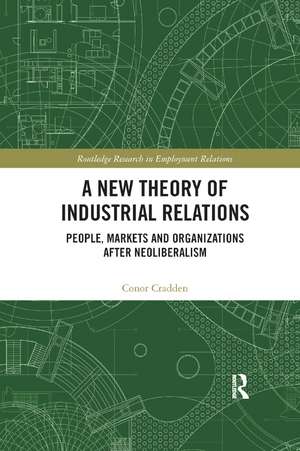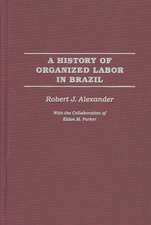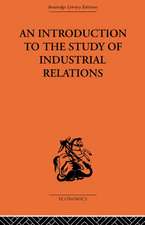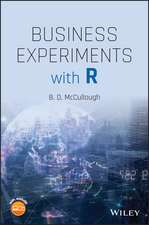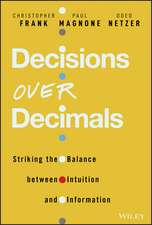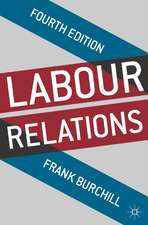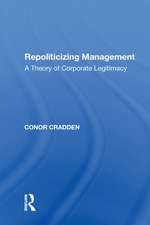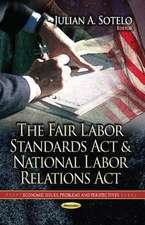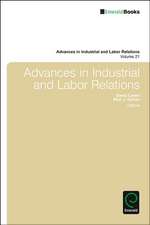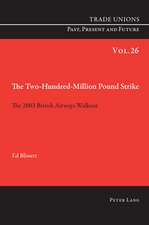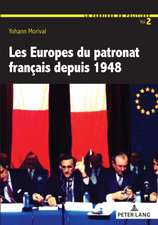A New Theory of Industrial Relations: People, Markets and Organizations after Neoliberalism: Routledge Research in Employment Relations
Autor Conor Craddenen Limba Engleză Paperback – 5 dec 2019
The most basic proposition made in the book is that work will be consensual—and, hence, that employees will actively and willingly cooperate with the implementation of organizational plans and strategies—when the governance of work is substantively legitimate. Although stable configurations of economic and organizational structures are possible in the context of a bare procedural legitimacy, it is only where work relationships are recognized as right and just that positive forms of cooperation will occur. The analytic purpose of the theory is to specify the conditions under which substantive legitimacy will arise. Drawing in particular on the work of Alan Fox, Robert Cox and Jürgen H
| Toate formatele și edițiile | Preț | Express |
|---|---|---|
| Paperback (1) | 436.14 lei 6-8 săpt. | |
| Taylor & Francis – 5 dec 2019 | 436.14 lei 6-8 săpt. | |
| Hardback (1) | 875.55 lei 6-8 săpt. | |
| Taylor & Francis – 5 dec 2017 | 875.55 lei 6-8 săpt. |
Din seria Routledge Research in Employment Relations
- 9%
 Preț: 934.94 lei
Preț: 934.94 lei -
 Preț: 231.55 lei
Preț: 231.55 lei -
 Preț: 416.22 lei
Preț: 416.22 lei -
 Preț: 414.91 lei
Preț: 414.91 lei -
 Preț: 414.32 lei
Preț: 414.32 lei - 12%
 Preț: 301.33 lei
Preț: 301.33 lei -
 Preț: 489.57 lei
Preț: 489.57 lei - 18%
 Preț: 1000.27 lei
Preț: 1000.27 lei - 12%
 Preț: 301.55 lei
Preț: 301.55 lei - 15%
 Preț: 293.39 lei
Preț: 293.39 lei - 18%
 Preț: 1221.12 lei
Preț: 1221.12 lei -
 Preț: 416.22 lei
Preț: 416.22 lei - 18%
 Preț: 1064.01 lei
Preț: 1064.01 lei -
 Preț: 489.26 lei
Preț: 489.26 lei -
 Preț: 428.40 lei
Preț: 428.40 lei -
 Preț: 416.22 lei
Preț: 416.22 lei - 12%
 Preț: 301.55 lei
Preț: 301.55 lei - 18%
 Preț: 1000.27 lei
Preț: 1000.27 lei - 26%
 Preț: 766.31 lei
Preț: 766.31 lei - 25%
 Preț: 824.40 lei
Preț: 824.40 lei - 26%
 Preț: 876.36 lei
Preț: 876.36 lei - 13%
 Preț: 294.77 lei
Preț: 294.77 lei -
 Preț: 485.07 lei
Preț: 485.07 lei - 15%
 Preț: 440.67 lei
Preț: 440.67 lei - 18%
 Preț: 1330.04 lei
Preț: 1330.04 lei - 26%
 Preț: 875.16 lei
Preț: 875.16 lei - 26%
 Preț: 765.62 lei
Preț: 765.62 lei - 15%
 Preț: 426.34 lei
Preț: 426.34 lei -
 Preț: 416.22 lei
Preț: 416.22 lei -
 Preț: 416.22 lei
Preț: 416.22 lei -
 Preț: 377.23 lei
Preț: 377.23 lei - 26%
 Preț: 875.55 lei
Preț: 875.55 lei - 18%
 Preț: 1117.43 lei
Preț: 1117.43 lei -
 Preț: 415.24 lei
Preț: 415.24 lei - 18%
 Preț: 1056.28 lei
Preț: 1056.28 lei
Preț: 436.14 lei
Nou
Puncte Express: 654
Preț estimativ în valută:
83.45€ • 87.37$ • 69.05£
83.45€ • 87.37$ • 69.05£
Carte tipărită la comandă
Livrare economică 05-19 aprilie
Preluare comenzi: 021 569.72.76
Specificații
ISBN-13: 9780367875848
ISBN-10: 0367875845
Pagini: 220
Dimensiuni: 152 x 229 x 15 mm
Greutate: 0.45 kg
Ediția:1
Editura: Taylor & Francis
Colecția Routledge
Seria Routledge Research in Employment Relations
Locul publicării:Oxford, United Kingdom
ISBN-10: 0367875845
Pagini: 220
Dimensiuni: 152 x 229 x 15 mm
Greutate: 0.45 kg
Ediția:1
Editura: Taylor & Francis
Colecția Routledge
Seria Routledge Research in Employment Relations
Locul publicării:Oxford, United Kingdom
Public țintă
PostgraduateCuprins
Chapter One: Can Industrial Relations Save the World?
Chapter Two: Industrial Relations Policy: Conflict & Cooperation in the Governance of Work
Chapter Three: Industrial Relations Theory: From Industrial Democracy to the Web of Rules and Back Again
Chapter Four: System, Lifeworld and Points in Between
Chapter Five: Frames of Reference
Chapter Six: A New Theory of Industrial Relations
Chapter Seven: What Can We Do with NTIR? Implications for Research and Policy
Chapter Two: Industrial Relations Policy: Conflict & Cooperation in the Governance of Work
Chapter Three: Industrial Relations Theory: From Industrial Democracy to the Web of Rules and Back Again
Chapter Four: System, Lifeworld and Points in Between
Chapter Five: Frames of Reference
Chapter Six: A New Theory of Industrial Relations
Chapter Seven: What Can We Do with NTIR? Implications for Research and Policy
Notă biografică
Conor Cradden is an independent researcher and consultant based in France. He works on industrial relations, the sociology of work and employment and international labour regulation. He is the author of two previous books, Repoliticizing Management: A Theory of Corporate Legitimacy (Ashgate, 2005) and Neoliberal Industrial Relations Policy in the UK: How the Labour Movement Lost the Argument (Palgrave, 2014).
Descriere
A New Theory of Industrial Relations: People, Markets and Organizations after Neoliberalism follows Alan Fox in supposing that our principal task is to understand the conditions under which employees will accept as legitimate – or reject as illegitimate – the ‘structures of the situation’ within which they work.
